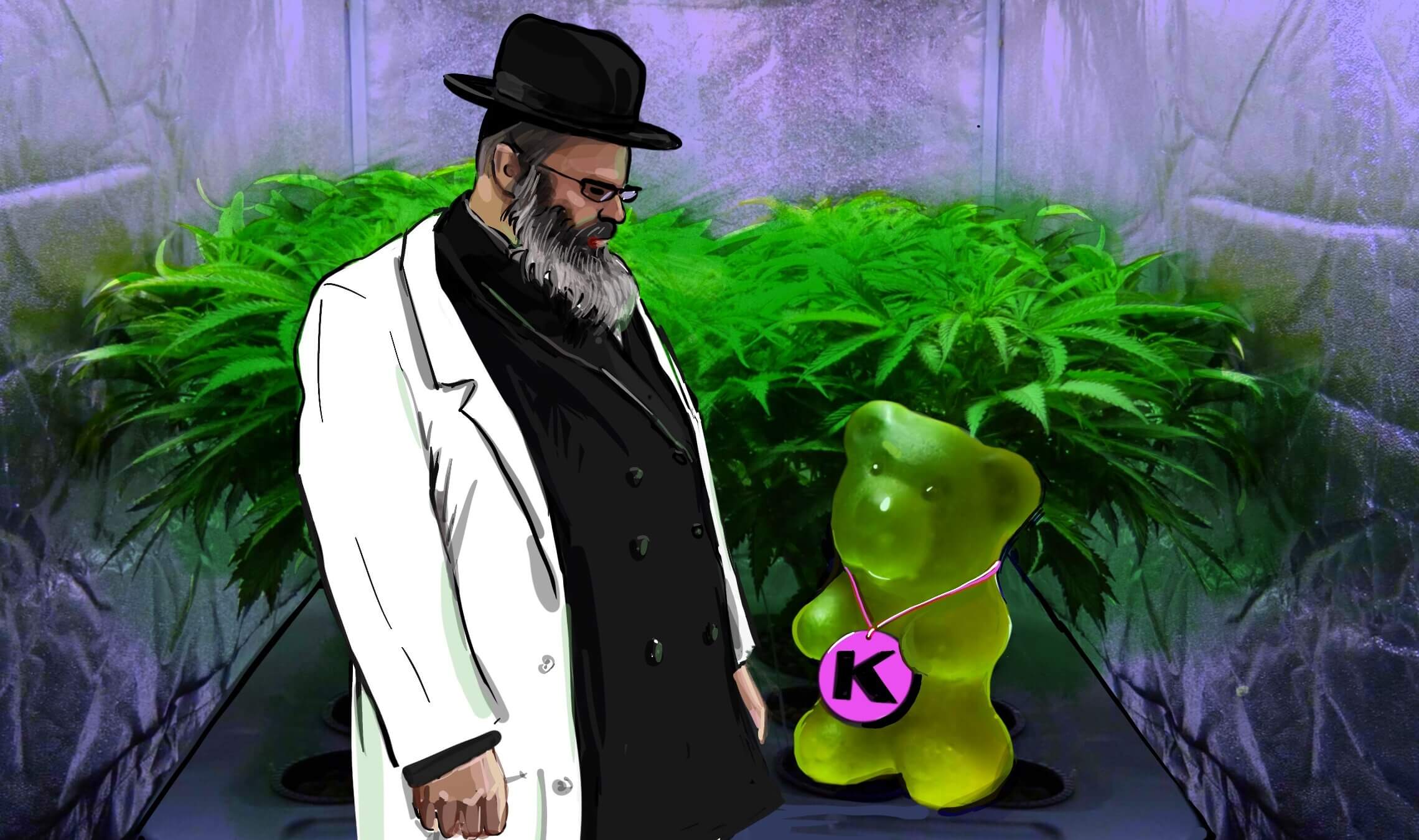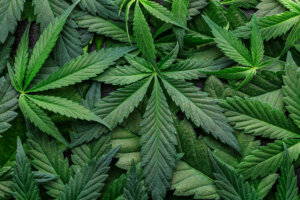Appealing to a higher authority — why cannabis provides a unique opportunity for the kosher industry
Kosher certifiers could become the de facto regulators of a burgeoning new business; will they step up to meet the challenge?

Graphic by Nikki Casey
The ad is unusual, to say the least.
In the video, posted to YouTube, a group of garbed hasidic men pose in front of a green screen as international Yiddish pop sensation Lipa Schmeltzer, standing behind a camera, tries to paint them into various classic New York locations.
Lipa’s having a hard time; the paintings aren’t looking so great. Looking for inspiration, Lipa picks up a blister pack of gum. On the branded package, we see it contains CBD, a chemical extracted from hemp that has been marketed as a panacea for all ailments. Lipa chews, and the creative juices start flowing.
By the end of the video, which is set to Schmeltzer’s hit “Gevaldik,” he has produced a beautiful group portrait. The advertisement is entirely in Yiddish, with the exception of three words that describe the gum: calm, focused, and awake. A card at the end reminds us that this is an advertisement for KosherCBD, a Brooklyn-based dispensary.
Schmeltzer’s advertisement is a testament to the massive growth of the cannabis industry in the United States over the last decade. CBD is now legal nationwide, and 37 states have legalized marijuana in some form. In New York it is now fully legal; New Jersey stores sold their first legal weed on April 21. With observant Jews piling into this market as both consumers and producers, it’s no surprise that demand for kosher certification has quickly followed.
Coverage of kosher cannabis has mostly gawked at the novelty of the idea; after all, it’s hard not to be struck by the sheer strangeness of Rabbi Chaim Kanievsky, one of Israel’s most important ultra-Orthodox rabbis, saying the blessing on pleasing smells and then taking a big whiff from a bundle of marijuana leaves (Kanievsky passed away on March 18; his funeral was attended by several hundred thousand people).
After speaking with many kosher regulators and Jewish cannabis producers, however, it has become clear to me that certifiers of cannabis products are not fully aware of the regulator mess into which they have stumbled. At the same time, I am convinced that kosher certifiers have a vital role to play in the American cannabis industry, if they expand the scope of their supervision just a little. In an industry that is plagued by quality control problems that the federal government has been slow to solve, kosher certifiers are uniquely positioned to become the nationally recognized mark of high-quality cannabis goods.
Divide and Conquer

Cannabis regulation is a mess. There are a couple of reasons for this, the most obvious being that the 37 states which have legalized marijuana have created a patchwork of rules that the federal government, which still prohibits the plant, cannot unite. But cannabis is also complicated because it is chemically complex, containing dozens of substances that combine to create a wide variety of effects. These substances can be extracted and recombined to create an astonishing variety of products.
The best-known molecule, THC, is responsible for most of marijuana’s psychoactive effects. Another molecule, CBD, is frequently marketed for pain and stress relief. Since it is now possible to control the ratio of these substances in extracts, tinctures and other cannabis products, the federal government has latched onto THC as the problem cannabinoid, effectively letting CBD and all the others off the hook.
The concern about THC has led to a complicated division among cannabis products. Since 2018, products containing less than 0.3% THC can be sold anywhere; if they contain more, they become federally illegal and are subject to state regulations instead. THC is also not the only psychoactive cannabis molecule; a synthetic cousin, delta-8 THC (most THC in marijuana is delta-9) derived from hemp produces similar but milder effects and is neither federally regulated nor particularly well studied.
In this thicket of closely related but legally distinct products, the question of how to tell what is safe for use has mostly fallen through the cracks. The FDA has approved CBD for medical use in a few cases, but has not reined in the many companies who market it as a cure for everything from insomnia to COVID-19. Given that the agency already struggles with its food-related responsibilities, according to a recent Politico investigation, it’s unlikely that CBD regulation will improve anytime soon.
The regulation of THC, on the other hand, has fallen to the states, which are put in the awkward position of mimicking a federal responsibility for a single set of products. As for delta-8 and other synthetic products, there is little federal or state oversight at all.
This legal morass translates into significant quality control issues. Studies have found that CBD products contain far more or less of the substance than advertised, and sometimes also contain mold, insecticide, or even THC. Testing is not carefully monitored; in some cases, manufacturers have passed off another product’s certificate of analysis as their own instead of paying for new testing.
THC is generally better regulated in states where it is legal, but there is still a great deal of variation; as soon as Arizona stepped up its inspections, it found that some products contained salmonella. All of these issues are magnified for delta-8 THC, which is both complicated to produce and totally unregulated. In January, a study of 27 delta-8 THC products found that not a single one was accurately labeled.
613 will Regulate

For both legal and cultural reasons, American kosher agencies have followed American government policies. In 1973, shortly after Congress classified marijuana as a Schedule I drug with no accepted medical use, Rabbi Moshe Feinstein issued a letter in which he denounced marijuana as both counter-cultural and disrespectful to one’s parents. But as states have legalized and the federal government has relaxed rules for everything but THC, kosher agencies have quickly moved to certify all kinds of cannabis products with an enthusiasm that is directly correlated with federal policy. (Notably, the story in Canada is very different: Despite federal legalization of marijuana in 2018, no major Canadian kashrut organization has certified either CBD or THC.)
The biggest shift has been around CBD products, whose acceptability is no longer even controversial. Today, all of the “big five” kosher certifiers will certify CBD products, though not all do so in practice. Certification of THC remains rare, but consensus seems to be forming that products designed for medical use can be certified. The Orthodox Union, the world’s largest kosher certifier, certifies a small number of THC products; Whole Kosher Services, an agency based in the southwest that pioneered THC certification, certifies a few non-medical THC products, as well, though it doesn’t expect this side of the business to grow.
The medicalization of THC has made kosher certification acceptable, but it also limits the market, since even most kosher consumers don’t expect their medicines to be certified. As for delta-8 THC, several agencies that I spoke with were aware of the products, but with the exception of Earth Kosher, a small Colorado-based agency, none have agreed to certify it.
None of the kosher agencies I spoke with thought that CBD supervision was anything special or particularly complex. Producers submit ingredient lists to the agencies, who check that everything is kosher; they also conduct regular, unannounced visits to ensure that the rules are being followed. When asked, no agency seemed particularly concerned about the use of infested hemp. While most agencies will look at lab results to ensure that the THC content is below the threshold, all of the agencies take the manufacturer at their word that the results submitted are accurate. None require third party certification.
When pressed about the need for more supervision, all the agencies gave me the same response: kosher concerns and food safety concerns are not the same, and kosher supervision only monitors exactly those things that matter to Jewish law. The problem is that food safety and kosher are intertwined; if American regulators are not checking that labels and lab tests are accurate, kosher regulators must approach them with a more skeptical eye, as well. When kosher agencies certify a regular chocolate, they’re one of many regulatory groups with overlapping interests. When they check on a CBD chocolate, they might be all alone.
This narrow focus means that kosher CBD products suffer from the same quality control issues as the rest of the industry. Products from two noted CBD manufacturers, for example, have both been tested to contain a level of CBD than is more than 10% off the labeled amount. Both products are also certified by Whole Kosher Services, an agency which has focused on this market. When I asked the agency’s director of sales, Shmuel Kronman, whether this presented a problem, he acknowledged the concern but said that from a kosher perspective it was not an issue.
Faced with this reality, kosher certifiers have a choice. They could, if they wanted, maintain an extremely narrow interest in exactly the things that make a food kosher, practicing extreme vigilance about what matters to Jewish law and nothing else. Or, with a little extra work, they could verify that producers are using accurate labels and industry standard food safety practices. Though the second path takes these organizations slightly outside of their comfort zone, agencies that choose this route may find producers and consumers that are ready and waiting for them.
Everybody wants to be kosher

Kosher products have an excellent reputation with both consumers and manufacturers. Despite the fact that kosher food is not necessarily healthier or higher quality, American shoppers regularly purchase kosher products based on the belief that they are better than the alternatives. This is, on occasion, correct. In the early 20th century, some Americans turned to kosher meat out of concern for working conditions in large midwestern slaughterhouses.
The perception of quality leads manufacturers to seek out supervision, too. According to Sue Fishkoff’s “Kosher Nation,” kosher certification at Chinese production facilities only took off after a 2008 scandal in which tens of thousands of infants became sick after eating formula tainted with melamine, which had been added to make the protein content seem higher than it really was.
Production-side demand for supervision is contagious up the supply chain. Unlike “organic,” “fair-trade” or “non-GMO,” which certify products at a particular stage of production, kosher products need to be certified at every single stage. A producer at the end of the supply chain — say, someone making CBD gummies — needs all-kosher ingredients, so they will exert pressure on their preferred suppliers to go kosher, or they will switch to suppliers who already are. Cannabis producers seeking out certification also discover that it’s relatively cheap. With the exception of the gelatin in gummies and some oils used in tinctures, nothing in cannabis products is inherently non-kosher, so certification does not typically involve major modifications to the products.
As more suppliers get certified, downstream producers seeking certification may discover that most of the work has been done for them. Curaleaf, for example, has certified its entire New York supply chain through Whole Kosher Services, including the flowers themselves. Because Curaleaf sells its extra flower to other state producers, a significant portion of the state’s flower is already certified.
In the case of cannabis, kosher supervision has a further advantage. Because kosher agencies are private companies that operate internationally, they can transcend the regulatory patchwork of state-by-state legalization without running afoul of federal law. According to Kronman, some cannabis producers have remarked that kosher supervisors come by their facilities more than any other inspector.
Kosher certification is optimally placed to become the nationally recognized mark of quality for cannabis products. The agencies are well respected, national, and already manage every stage of production. Certification is relatively cheap, and it’s assumed by consumers to be a mark of quality. With the stars aligned in their favor, what would it take for a kosher agency to adopt this mantle?
Certification in the Wild West
This psychedelic "hekhsher" stamp appeared on many a tab of LSD, probably around San Francisco in the 70s. From the blotter archive of @markmccloudlsd. Thanks to @erik_davis for sharing this artifact with me! pic.twitter.com/RxaBOG9x4s
— Sam Shonkoff (@samshonkoff) December 15, 2021
An agency that wished to become a certifier of quality cannabis products would need to widen the scope of inspections, but not by much. Rather than trust a manufacturer’s product analysis, agencies could insist on regular third-party testing for CBD products. They could also test individual ingredients for purity, as some already do. For THC, they might also insist on stricter rules in states without robust inspections.
Using kosher supervisors as multi-purpose inspectors is not a new idea. Star-K, a major Baltimore-based agency, has trained some of its certifiers to check whether foods can be labeled “organic;” in a 2019 interview, the agency’s Rabbi Jonah Gewirtz told me that the agency had been approached about certifying products as halal for Muslim consumption, as well. But whereas organic and halal labeling requires new training and possibly major production changes, regulation of cannabis quality simply requires that the kosher supervisor verify that the producer is doing what they already say they’re doing.
Ironically, kosher regulation in this Wild West environment takes certification back to its roots — that is, to those times when kosher supervision alone stood between a food producer and the marketplace. Ever-present FDA regulation has meant that the onus of basic safety and label accuracy has not fallen on kosher certifiers, who are free to narrowly focus on kosher concerns; Rabbi Moshe Feinstein, for example, famously ruled that federal regulations absolve Jews from the need to verify that dairy farmers aren’t adulterating cow milk with the milk of other animals.
The Era of Kosher Kush
Kosher certification is governed by Jewish law, halakhah, which, like all legal systems, overlaps with ethics but is not synonymous with it. Treating Jewish law as the totality of ethics is dangerous business that can lead to embarrassments such as cigarettes that are kosher for Passover and kosher meat processing facilities with abysmal working conditions. When Jewish law is employed to correct injustice, on the other hand, many Jews rightly feel a sense of pride. This desire to see more overlap between halakhah and ethics has already led to the creation of ethically-minded kosher certifications, like Tav HaYosher, which focus not on food but on how workers are treated.
Deserved or not, kosher certification is considered to be a sign of quality, and kosher certifiers generally coast on this reputation by maintaining a careful silence. This strategy has worked, but it can also backfire if a certified product is discovered to be dangerous. Kosher CBD products do not seem to be immune from the industry’s quality control issues; if certification does not correlate with quality, consumers will start to notice.
The heft of “kosher” also faces particular challenges in the recreational drug market because the word has long been used in ways that have nothing to do with Jewish law. The marijuana strain Kosher Kush is said to have been blessed by a rabbi; whether this is true or not, the strain is not actively certified. More troubling is Kosher Blends, a California-based CBD producer which, despite the name, does not advertise any sort of certification. Reading the company’s website, one gets the impression that “kosher” just means high quality — a good message to cultivate, but one that becomes quickly confusing if the products are not actually kosher, as well
Right now, kosher cannabis products represent a tiny portion of the industry; dispensaries that don’t specialize in kosher cannabis are unlikely to stock it, and many Orthodox rabbis are still wary about recreational marijuana use. But as cannabis purchases have moved off the street and into sleek dispensaries, consumers will increasingly demand products that are not just legal, but also safe and accurately labeled. While kosher certifiers are not currently in the cannabis quality control business, it wouldn’t take much for them to become the de facto regulator of the entire industry. Consumers already think that kosher kush is better; it would not be hard to make it so.
















